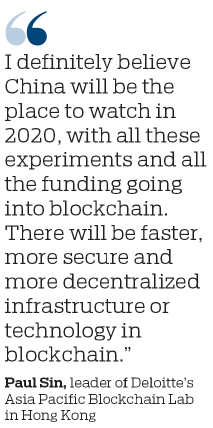Experts expect Asia to play lead development role across the world

Asia is expected to lead the development of blockchain technology worldwide, with China among the key countries to watch next year, according to experts.
Jason Potts, professor of economics and director of the Blockchain Innovation Hub at RMIT University in Melbourne, Australia, said Asian countries, including China, Singapore, South Korea and even Vietnam, are making huge investments in developing early-stage pilot projects and business experiments using blockchain technology. They are focusing on supply chains across a range of industries.
"We are seeing that (investment) more than we are seeing it in the United States, and definitely more than in Europe," said Potts, co-founder of the Worldwide Blockchain Innovation Association. "So, compared with other parts of the world, there is a lot more research and development taking place in Asia in the blockchain space."
Potts, who is bullish about the Asian blockchain industry for the immediate future, said this investment in research and development is going to have an impact as it starts "translating into actual business models and affecting a lot of different industries".
At the end of May, Asia accounted for more than 60 percent of over 6,000 blockchain projects globally, according to a report by data service provider Blockdata, which is based in Beijing.
Paul Sin, leader of Deloitte's Asia Pacific Blockchain Lab in Hong Kong, said there are two different kinds of blockchain development in Asia. He said that while countries focusing on financial inclusion and supply chain, such as China, will develop more applications for various industries, others may be more interested in the cryptocurrency business.
For example, Singapore has emerged as one of the most favorable destinations for initial coin offerings. Last year, it led the world with 228 ICOs completed, followed by the United States and the United Kingdom, according to a report by coin market ranking chart app CoinGecko.
Last year, Korea JoongAng Daily reported that Jeju Island in South Korea proposed building a special zone for blockchain, including allowing startups to hold ICOs on the island to raise funding.
Sin said: "In China, the only crypto-related or public blockchain-related application will be the central bank's digital currency. In fact, we believe even the central bank's digital currency would probably be running on permissioned blockchain-because one of the features is that the government can monitor all the transactions."
"Permissioned blockchain" refers to a blockchain network that can only be shared with certain participants in a closed ecosystem, providing an added level of security.
In October, Huang Qifan, vice chairman of think tank the China Center for International Economic Exchange, said China was likely to be the first country to issue sovereign digital currency, with the People's Bank of China, the central bank, having studied digital currency electronic payment for about five years.
Giulio Romanelli, partner at global consultancy McKinsey & Company's Sydney office, said, "To date, the biggest businesses have evolved in China, where it appears that the growing focus on an ecosystem economy has found an ideal partner in blockchain technology."
Two types of blockchain development models have emerged in China, Romanelli said. For example, the banking arm of Ping An Insurance, the country's second-largest life insurer, is promoting the adoption of blockchain through an ecosystem-driven approach to engage its partners and users. On the other hand, regulators have been rolling out standards and setting up pilot platforms to drive the market growth.
Such examples of success in leveraging blockchain technology to extract real business value would support further growth of investments in the Chinese blockchain market, but will likely also be helpful in promoting additional experimentation in Asia and globally, Romanelli said.
Potts, from RMIT University, said there are now fewer regulatory barriers, especially in finance and payments, which allows the industry to innovate and explore new business models more easily. The main challenge is coordinating user coalitions in adopting the technology across a sector or value chain.
"Blockchain is a network technology, so just one firm adopting it is not really enough, because all of its partners also need to adopt the same infrastructure technology," he said.
Potts said he believes the bigger role played by governments in Asia, particularly in China, makes it easier to solve the problem of coordination, through mandating technological standards. "But it also requires industry-level coordination," he said.
The geopolitical implications of blockchain infrastructure are also going to be a growing issue in the near future, particularly in relation to trade negotiations and treaties, Potts said.
Matt Higginson, partner at McKinsey's office in Boston, US, said he expects some consolidation by competing consortia, such as through the merger of trade finance solutions, expanded adoption of some protocols and the growth of more mature, regulated platforms for digital assets.
"Over the past 18 months, the early enthusiasm for blockchain offering solutions to many of the (corporate) world's perennial pain points appears to have waned," Higginson said. "Instead, efforts have doubled down on applications where the unique properties of distributed ledger technology (and blockchain) provide additional value beyond existing solutions."
Higginson said the key applications of blockchain are: cross-border payments; supply chain; trade finance; asset management; and digital identity. He added that he believes these applications will become more mainstream next year.
"If investment in the technology in Asia expands or continues apace, the natural epicenter for growth will gravitate to Asian markets," he said, noting that many efforts have already been made in digitizing money and shipping documents, and establishing digital asset trading platforms.
Sin said: "I definitely believe China will be the place to watch in 2020, with all these experiments and all the funding going into blockchain. There will be faster, more secure and more decentralized infrastructure or technology in blockchain."
More integration will be seen in China between blockchain and other technologies such as the internet of things and artificial intelligence, Sin added, in view of the vast amount of data the country can gather.






















